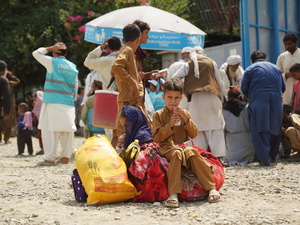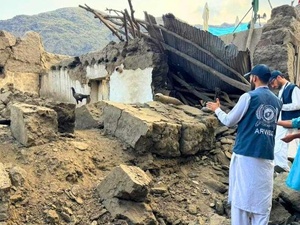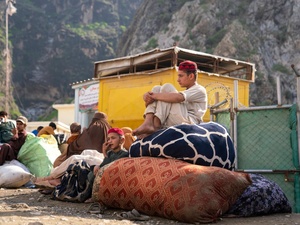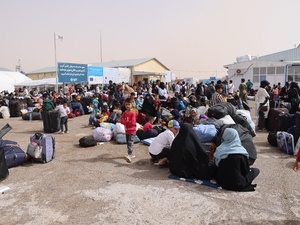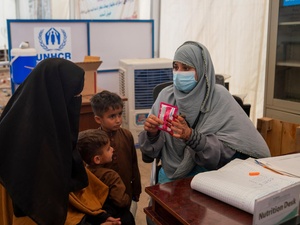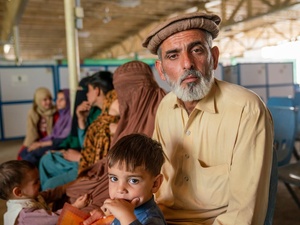UNHCR issues plan of action for Afghanistan region
UNHCR issues plan of action for Afghanistan region
GENEVA - Calling for innovative approaches and a high degree of flexibility, UNHCR on Tuesday unveiled an updated regional plan of action aimed at easing the immediate plight of displaced and vulnerable Afghans while laying the groundwork for longer-term solutions to one of the world's most protracted refugee situations.
"The rapidly unfolding events in Afghanistan have provided the humanitarian community with new opportunities to help millions of Afghans who have suffered far too much, for far too long," said High Commissioner for Refugees Ruud Lubbers. "But we have to move fast. We need to closely coordinate our work and we must be as creative and as flexible as possible. I have called for an updated UNHCR plan of action that takes into account the many continuing uncertainties in the region while at the same time laying the foundation for longer-term solutions."
The UNHCR regional action plan, which initially covers the agency's activities through mid-2002, sets out four main areas of work both inside Afghanistan and in surrounding states:
- Providing protection and solutions-oriented assistance to refugees in neighbouring countries, both new arrivals and those from previous influxes.
- Maintaining emergency preparedness in neighbouring states as long as there is a potential for new displacement.
- Assisting and promoting protection and return for internally displaced people (IDPs) and other vulnerable Afghans inside Afghanistan, within a U.N. inter-agency framework.
- Preparing for the regional resumption of assisted, voluntary return of refugees.
For planning purposes, UNHCR activities in the region through June will cover the needs of up to 880,000 Afghans. This will include 500,000 IDPs and returnees inside Afghanistan; 300,000 post-September Afghan refugees in Pakistan; and up to 80,000 post-September Afghan refugees in Iran. Even before the September 11 terror attacks in the United States, there were already more than 3.5 million Afghans in Pakistan and Iran.
Under the updated regional plan, UNHCR's estimated overall budget requirements from 1 October 2001 through the first half of 2002 are $181.8 million. Of this, an estimated $140 million are post?September emergency requirements to be covered under a special "Supplementary Budget." The remaining $41.8 million falls within UNHCR's regular Annual Programme Budget for the region for the last quarter of 2001 ($11.9 million) through the first half of 2002 ($29.9 million).
Lubbers said the updated regional action plan strives to ensure that the agency's existing annual programme activities for the region for 2001-02 and the new emergency requirements covered under the special Supplementary Budget are fully integrated in one cohesive approach.
He also noted that the plan incorporated a number of scenarios, including the fact that the new reality on the ground in Afghanistan has sparked population movements in several directions - within the country itself; into neighbouring states; and from neighbouring states back into Afghanistan. That is why UNHCR continues to take a two-pronged approach focused on increasing humanitarian assistance inside Afghanistan while at the same time promoting protection and assistance in countries of asylum.
Operationally, UNHCR expects to re-establish its presence - security allowing - in all five of Afghanistan's main cities; Kabul, Mazar-i-Sharif, Herat, Kandahar and Jalalabad. In addition, the agency's existing network of 12 field units will be expanded to 22, ensuring an extensive field presence in key geographic regions where returns of refugees and IDPs are expected.
Under the plan, UNHCR will give national staff a central role in its work and intends to recruit many more women, who were banned from employment during Taleban rule. The agency plans to have up to 267 national staff working throughout the country before mid-year.
Recent developments in Afghanistan have already rekindled interest in repatriation among many of the 3.5 million Afghan refugees in the region. Spontaneous returns on a relatively small scale are already being reported from both Iran and Pakistan. Larger returns could begin next spring, particularly if further progress is made in terms of the political and military stabilization in Afghanistan. A comprehensive repatriation and reintegration planning exercise is currently being undertaken involving UNHCR offices in Afghanistan and neighbouring countries. Discussions with partners have also been initiated on possible implementation of initial reintegration activities.
"The return of millions of refugees and displaced people is crucial to stability, rehabilitation and the long-term development of Afghanistan," Lubbers said. "UNHCR will work very closely with the U.N. Development Programme and other agencies to ensure that the elements of relief assistance, initial rehabilitation and development are smoothly integrated."


